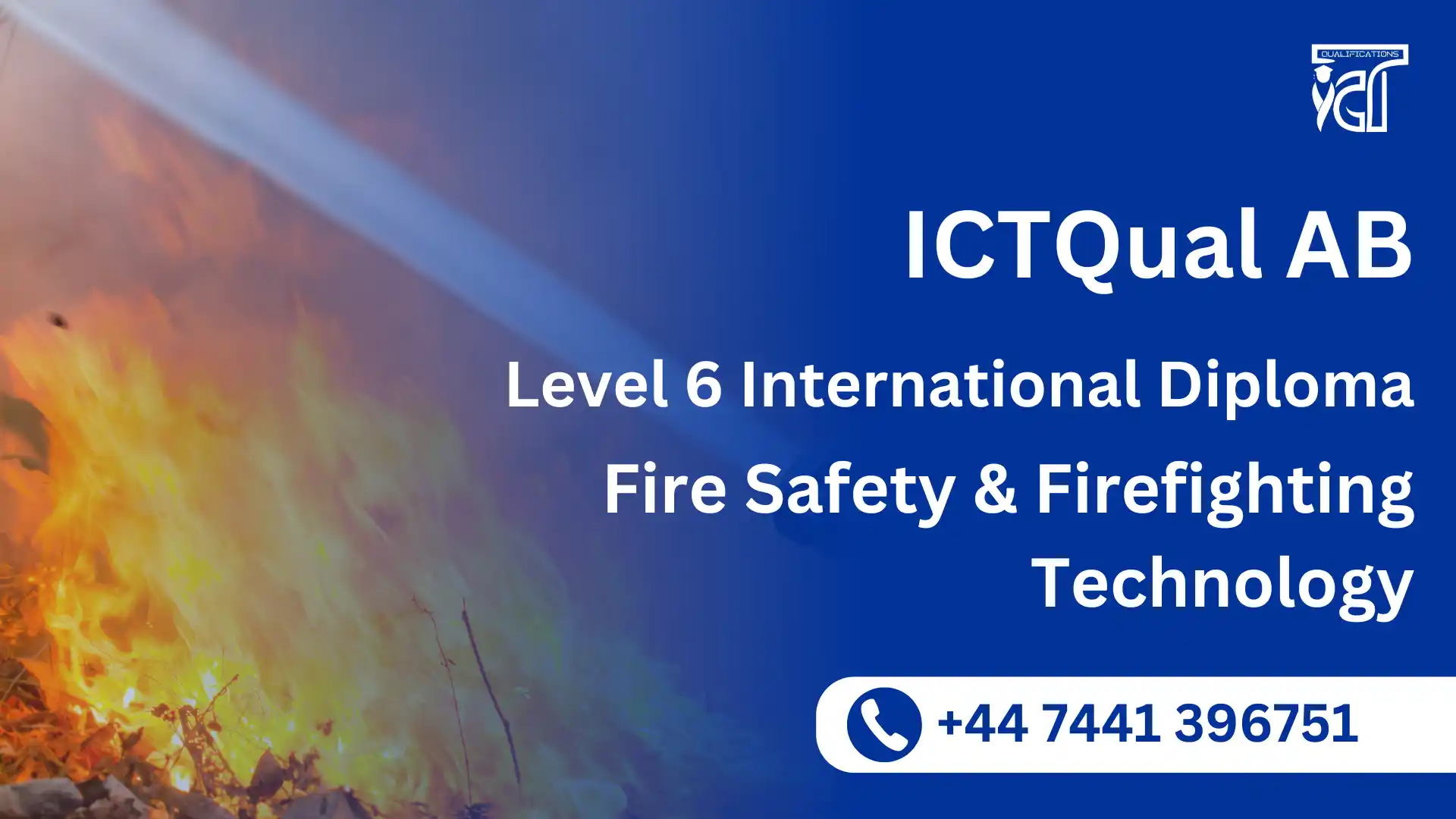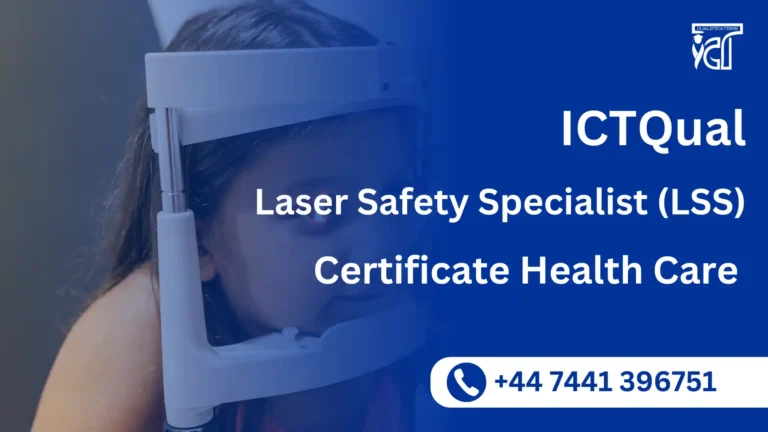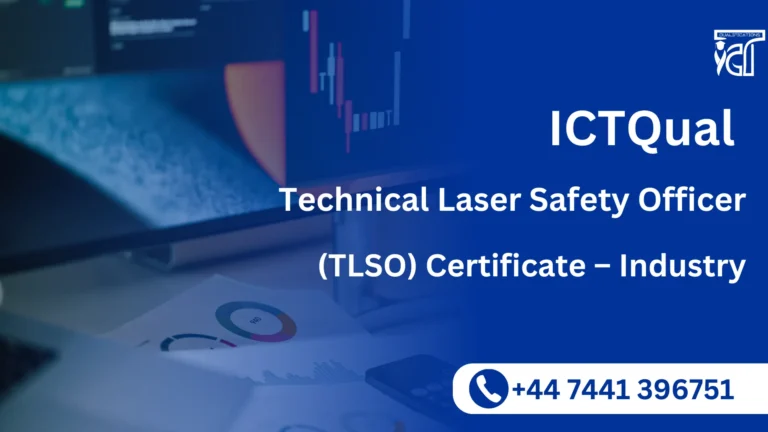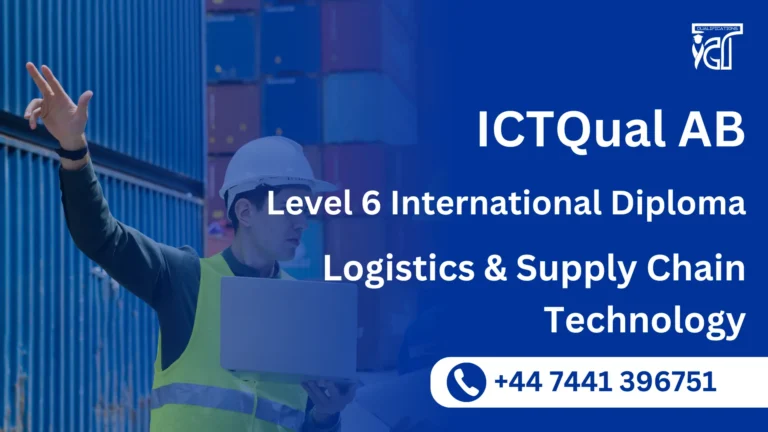The ICTQual AB Level 6 International Diploma in Fire Safety and Firefighting Technology is a specialised, industry-focused qualification designed to prepare learners for advanced roles in fire safety management, emergency response, and firefighting technology. Spanning three years and comprising 360 credits, this comprehensive programme blends theoretical knowledge with practical skills to meet the global standards of fire and emergency services.
ICTQual AB Level 6 International Diploma in Fire Safety and Firefighting Technology is ideal for both fresh learners eager to enter the fire safety and firefighting profession, and experienced personnel seeking to upgrade their expertise and career prospects. Learners will gain critical knowledge in fire dynamics, risk assessment, emergency planning, and advanced firefighting techniques, ensuring they are equipped to respond effectively in high-pressure environments.
Graduates can pursue rewarding careers as Fire Safety Officers, Fire Inspectors, Firefighting Technologists, or Emergency Response Coordinators across industries such as oil and gas, aviation, construction, and municipal fire services. The curriculum not only builds technical competencies but also enhances leadership, problem-solving, and decision-making skills, which are essential for managing emergency operations and maintaining workplace safety standards.
Completing this internationally recognised diploma ICTQual AB Level 6 International Diploma in Fire Safety and Firefighting Technologyoffers significant long-term benefits. ICTQual AB Level 6 International Diploma in Fire Safety and Firefighting Technology provides a strong foundation for further study in fire engineering or safety management and positions learners for senior or specialised roles within fire and rescue services worldwide. By mastering advanced firefighting technology and fire safety strategies, learners will gain the expertise and confidence to protect lives, property, and critical infrastructure in today’s complex and evolving safety landscape.
ICTQual AB Level 6 International Diploma in Fire Safety and Firefighting Technology
This qualification, the ICTQual AB Level 6 International Diploma in Fire Safety and Firefighting Technology, consists of 36 mandatory units.
Year 1 – Foundation in Fire Safety and Firefighting Technology
- Principles of Fire Science and Combustion
- Introduction to Fire Safety Management
- Fire Dynamics and Behaviour
- Fire Prevention and Hazard Identification
- Basics of Firefighting Equipment
- Health, Safety, and Environmental Awareness
- Fire Risk Assessment Fundamentals
- Emergency Response Planning
- Laboratory Techniques in Fire Safety
- Technical Report Writing
- Introduction to Fire Safety Regulations and Standards
- Fire Simulation and Safety Software Basics
Year 2 – Intermediate Fire Safety and Firefighting Technology
- Advanced Fire Risk Assessment Techniques
- Fire Detection and Alarm Systems
- Fire Suppression Systems and Methods
- Industrial Fire Safety Management
- Fire Safety in High-Risk Environments
- Emergency Evacuation Planning and Procedures
- Process Control and Safety Automation
- Data Analysis and Fire Incident Investigation
- Project Planning and Technical Communication
- Quality Control and Assurance in Fire Safety
- Advanced Laboratory Experiments in Fire Safety
- Fire Safety Compliance and Regulatory Standards
Year 3 – Advanced Fire Safety and Firefighting Technology
- Advanced Firefighting Techniques and Strategies
- Fire Safety Project Management
- Fire Behaviour Modelling and Simulation
- Hazardous Materials and Industrial Fire Protection
- Emergency Response Leadership and Coordination
- Risk Assessment and Safety Decision-Making
- Fire Safety in Large-Scale Facilities and Complex Sites
- Advanced Laboratory Techniques and Field Testing
- Supply Chain and Logistics in Fire Safety Operations
- Capstone Project in Fire Safety and Firefighting Technology
- Professional Development and Leadership in Safety Management
- Strategic Decision-Making in Fire Safety and Emergency Operations
Learning Outcomes for the ICTQual AB Level 6 International Diploma in Fire Safety and Firefighting Technology:
Year 1 – Foundation in Fire Safety and Firefighting Technology
Principles of Fire Science and Combustion
- Understand the chemistry and physics of fire, including combustion processes.
- Analyse fire behaviour under different conditions.
- Apply fire science principles to practical safety measures.
Introduction to Fire Safety Management
- Learn the fundamentals of fire safety planning and management.
- Understand roles and responsibilities in fire safety operations.
- Implement basic strategies for workplace and industrial fire safety.
Fire Dynamics and Behaviour
- Examine fire growth, spread, and heat transfer mechanisms.
- Analyse factors influencing fire intensity and development.
- Apply fire dynamics knowledge to safety and prevention strategies.
Fire Prevention and Hazard Identification
- Identify common fire hazards in industrial and commercial settings.
- Implement preventive measures to minimise fire risks.
- Conduct basic hazard assessments to inform safety planning.
Basics of Firefighting Equipment
- Understand the function and operation of firefighting tools and systems.
- Apply equipment knowledge in controlled training scenarios.
- Ensure proper maintenance and readiness of firefighting apparatus.
Health, Safety, and Environmental Awareness
- Learn key health and safety principles relevant to Fire Safety & Firefighting Technology.
- Understand environmental impacts of fire and firefighting.
- Implement safe practices in all fire safety operations.
Fire Risk Assessment Fundamentals
- Conduct basic fire risk assessments in various settings.
- Identify potential hazards, evaluate risks, and recommend controls.
- Prepare foundational risk assessment reports.
Emergency Response Planning
- Develop emergency response strategies for fire incidents.
- Plan evacuation procedures and resource allocation.
- Coordinate initial emergency response efforts effectively.
Laboratory Techniques in Fire Safety
- Conduct controlled experiments to analyse fire behaviour.
- Record and interpret experimental data.
- Apply laboratory results to practical safety solutions.
Technical Report Writing
- Develop skills to produce professional fire safety reports.
- Present data, analysis, and recommendations clearly.
- Apply proper formatting, referencing, and technical writing conventions.
Introduction to Fire Safety Regulations and Standards
- Understand local and international fire safety regulations.
- Apply standards to ensure compliance in practical scenarios.
- Evaluate safety policies and procedures against regulatory requirements.
Fire Simulation and Safety Software Basics
- Gain basic proficiency in fire simulation and modelling tools.
- Analyse potential fire scenarios using software applications.
- Apply simulation results to improve fire safety planning.
Year 2 – Intermediate Fire Safety and Firefighting Technology
Advanced Fire Risk Assessment Techniques
- Conduct in-depth fire risk assessments for complex environments.
- Implement quantitative and qualitative assessment methods.
- Recommend advanced control measures based on assessment outcomes.
Fire Detection and Alarm Systems
- Understand principles of fire detection and alarm technologies.
- Analyse system performance and reliability.
- Implement appropriate detection and warning strategies.
Fire Suppression Systems and Methods
- Learn advanced fire suppression techniques, including sprinkler and gas systems.
- Evaluate effectiveness in different scenarios.
- Apply suppression methods safely and efficiently.
Industrial Fire Safety Management
- Manage fire safety programmes in industrial and commercial facilities.
- Monitor compliance and performance of safety systems.
- Integrate fire safety planning with operational processes.
Fire Safety in High-Risk Environments
- Identify hazards in chemical plants, oil & gas, and other high-risk sites.
- Develop tailored fire safety strategies.
- Implement mitigation and emergency response plans.
Emergency Evacuation Planning and Procedures
- Design comprehensive evacuation plans.
- Coordinate drills and emergency response exercises.
- Ensure effective communication during emergencies.
Process Control and Safety Automation
- Integrate automated safety systems in industrial operations.
- Analyse control processes for reliability and efficiency.
- Optimise safety automation to prevent fire incidents.
Data Analysis and Fire Incident Investigation
- Analyse data from fire incidents to identify causes.
- Prepare incident investigation reports with recommendations.
- Apply findings to prevent future occurrences.
Project Planning and Technical Communication
- Plan and manage fire safety projects.
- Communicate technical information clearly to stakeholders.
- Apply project management principles to ensure timely completion.
Quality Control and Assurance in Fire Safety
- Monitor and evaluate fire safety systems and processes.
- Implement quality assurance techniques to ensure standards compliance.
- Conduct audits and inspections to verify system performance.
Advanced Laboratory Experiments in Fire Safety
- Perform complex laboratory simulations and tests.
- Analyse results to validate fire safety models.
- Apply experimental findings to practical scenarios.
Fire Safety Compliance and Regulatory Standards
- Interpret advanced regulations and industry standards.
- Ensure operational compliance in all fire safety activities.
- Develop strategies to maintain continuous regulatory adherence.
Year 3 – Advanced Fire Safety and Firefighting Technology
Advanced Firefighting Techniques and Strategies
- Master advanced methods for fire suppression in diverse scenarios.
- Apply tactical decision-making in high-pressure situations.
- Integrate knowledge of fire dynamics with practical firefighting.
Fire Safety Project Management
- Lead large-scale fire safety projects.
- Coordinate teams, resources, and timelines efficiently.
- Evaluate project outcomes and implement continuous improvement strategies.
Fire Behaviour Modelling and Simulation
- Apply modelling techniques to predict fire spread and impact.
- Analyse simulation results for planning and prevention.
- Optimise safety strategies using predictive tools.
Hazardous Materials and Industrial Fire Protection
- Identify risks associated with hazardous substances.
- Implement specialised protection systems for industrial environments.
- Apply emergency response techniques specific to hazardous materials.
Emergency Response Leadership and Coordination
- Lead multidisciplinary teams during fire emergencies.
- Develop coordination protocols for rapid and effective responses.
- Evaluate and improve emergency response strategies.
Risk Assessment and Safety Decision-Making
- Conduct comprehensive risk assessments in complex scenarios.
- Apply analytical frameworks for strategic safety decisions.
- Recommend measures to minimise fire risks in industrial operations.
Fire Safety in Large-Scale Facilities and Complex Sites
- Manage fire safety in factories, refineries, and commercial complexes.
- Develop operational plans for multi-level facilities.
- Implement monitoring and compliance strategies effectively.
Advanced Laboratory Techniques and Field Testing
- Conduct advanced experiments and field tests.
- Validate fire safety systems and operational protocols.
- Analyse results for optimisation and compliance purposes.
Supply Chain and Logistics in Fire Safety Operations
- Understand procurement, distribution, and maintenance of fire safety equipment.
- Optimise logistics for emergency preparedness.
- Integrate supply chain management with operational safety planning.
Capstone Project in Fire Safety and Firefighting Technology
- Undertake a comprehensive, real-world fire safety project.
- Demonstrate integration of all theoretical and practical knowledge.
- Present findings and solutions professionally.
Professional Development and Leadership in Safety Management
- Develop leadership, teamwork, and communication skills.
- Prepare for senior roles in fire safety and emergency management.
- Apply strategic planning and operational oversight in professional contexts.
Strategic Decision-Making in Fire Safety and Emergency Operations
- Make informed, high-level decisions in fire safety management.
- Evaluate risks, operational constraints, and resources strategically.
- Implement policies and procedures for long-term fire safety optimisation.
This diploma equips learners with advanced technical knowledge, leadership skills, and practical expertise in fire safety and firefighting technology. It opens doors to global career opportunities, enhances professional credibility, and prepares learners for leadership roles in emergency response and safety management.
1. Professional Advancement
- Gain specialised expertise in fire dynamics, firefighting techniques, and safety management.
- Boost employability for senior positions in firefighting, emergency response, and fire safety consultancy.
- Strengthen decision-making and leadership skills for managing critical situations.
- Stay updated with modern firefighting technologies and global safety standards.
2. Global Career Opportunities
- Access opportunities across industries such as oil and gas, aviation, marine, construction, and municipal services.
- Meet international requirements for fire safety roles in high-risk industries.
- Build a competitive edge for positions in both public and private sectors.
- Expand career potential in multinational organisations and government agencies.
3. Academic Progression
- Provides a strong foundation for Level 7 Diplomas in Fire Safety or Safety Engineering.
- Supports entry into postgraduate degrees in fire engineering or occupational safety.
- Prepares learners for advanced certifications in firefighting and emergency management.
- Enhances long-term academic growth in related technical fields.
4. Practical Skills and Confidence
- Develop hands-on competencies for responding effectively to emergencies.
- Improve risk assessment and fire prevention planning skills.
- Gain the confidence to manage high-pressure situations and protect critical infrastructure.
- Build teamwork and communication abilities essential for firefighting operations.
The ICTQual AB Level 6 International Diploma in Fire Safety and Firefighting Technology is tailored for motivated learners who are passionate about advancing their careers in fire safety, firefighting, and emergency management. Whether you are new to the field or an experienced professional seeking to strengthen your expertise, this diploma provides the skills and knowledge to thrive in high-stakes environments.
1. Aspiring Firefighters and Safety Professionals
- Individuals seeking to enter the firefighting or fire safety industry.
- Learners aiming to develop a solid understanding of modern firefighting techniques and safety protocols.
- Those motivated to serve communities and industries through emergency response roles.
- Candidates eager to gain internationally recognised skills for fire safety roles.
2. Experienced Fire and Emergency Responders
- Professionals already working in firefighting, industrial safety, or emergency services.
- Learners aiming to upgrade their qualifications for senior or supervisory positions.
- Individuals wishing to enhance their technical knowledge in fire dynamics and risk management.
- Fire officers or team leaders looking to formalise their skills with a Level 6 qualification.
3. Industrial and Occupational Safety Personnel
- Safety officers and managers in sectors such as oil and gas, marine, construction, and aviation.
- Learners seeking to deepen their expertise in fire prevention and crisis response.
- Professionals responsible for enforcing workplace safety standards and emergency procedures.
- Individuals wanting to broaden their career options within high-risk industries.
4. Career Changers and Fresh Graduates
- Recent graduates looking to pursue a rewarding career in firefighting or fire safety.
- Learners from related disciplines such as engineering or occupational health who wish to transition into fire safety roles.
- Career changers seeking a globally relevant qualification to enter the firefighting and safety industry.
- Individuals committed to long-term professional growth in fire safety and emergency response.
Completing the ICTQual AB Level 6 International Diploma in Fire Safety and Firefighting Technology provides learners with a strong foundation for both academic and professional advancement. This qualification prepares learners to pursue higher-level studies or step into senior roles within critical safety and emergency response sectors worldwide.
1. Academic Advancement
- Progress to Level 7 Diplomas in Fire Safety Management, Safety Engineering, or Occupational Safety.
- Enrol in postgraduate degrees such as Fire Engineering, Risk Management, or Emergency Planning.
- Strengthen eligibility for advanced technical certifications in fire safety and emergency management.
- Build a pathway towards research or specialised study in fire science and disaster response.
2. Career Development
- Qualify for senior positions such as Fire Safety Officer, Emergency Response Manager, or Fire Safety Consultant.
- Access leadership opportunities in industries including oil and gas, aviation, marine, construction, and municipal firefighting services.
- Broaden career options within multinational organisations, government agencies, and private sector safety departments.
- Enhance your professional profile to compete effectively in global fire safety and emergency services markets.
3. Long-Term Opportunities
- Establish a robust career trajectory in high-risk industry safety management and firefighting leadership.
- Expand networking and professional connections in international fire safety organisations.
- Lay the groundwork for lifelong learning and continuous professional development in fire and safety technology.
- Increase employability in roles requiring advanced knowledge of fire dynamics, prevention, and crisis management.
As an approved centre of ICTQual AB, we provide two flexible certification routes for the ICTQual AB Level 6 International Diploma in Fire Safety and Firefighting Technology, ensuring accessibility for both experienced professionals and fresh learners worldwide:
Route 1: Experienced Professionals
- Designed for learners with a minimum of six (6) years of verifiable, relevant industry experience in firefighting, fire safety, or emergency response.
- Your proven expertise allows you to progress directly towards certification without completing all standard assignments.
- Ideal for professionals seeking formal recognition of their skills and career advancement opportunities.
Route 2: Fresh Learners or Early-Career Candidates
- Tailored for individuals new to the field or with limited industry experience.
- Requires the completion of 36 structured assignments, carefully designed to build strong theoretical knowledge and practical skills.
- Provides a step-by-step learning experience to prepare you for advanced roles in fire safety and firefighting technology.
Enrol today with our approved centre to begin your journey toward an internationally recognised qualification that strengthens your expertise and opens doors to global career opportunities in fire safety and emergency response.in access to expert guidance, quality learning resources, and a recognised pathway to succeed in the global business and trade environment.
Entry Requirements
To enrol in the ICTQual AB Level 6 International Diploma in Fire Safety and Firefighting Technology, learners must meet the following criteria to ensure they are prepared for the academic and professional demands of the course:
Minimum Age
- Learners must be at least 19 years old at the time of enrolment.
Educational Background
- A Level 5 Diploma or an equivalent qualification in a relevant field (e.g., Fire Safety, Occupational Safety, or Engineering).
- Alternatively, completion of secondary education with substantial relevant industry experience may be considered.
Professional Experience
- Route 1: A minimum of six (6) years of verifiable work experience in firefighting, fire safety, or emergency response for direct certification.
- Route 2: Fresh learners or those without sufficient experience must complete 36 assignments as part of their qualification pathway.
Language Proficiency
- Competence in English language (written and spoken) is required, as course materials and assessments are delivered in English.
- An IELTS score of 5.5 or equivalent is recommended for non-native speakers.
Additional Recommendations
- Basic computer literacy to manage online resources, assignments, and communications.
- A strong commitment to safety, emergency preparedness, and continuous professional development.
Register Now
Qualification Process
Qualification Process for the ICTQual AB Level 6 International Diploma in Fire Safety and Firefighting Technology
- Self-Assessment:
Begin by evaluating your eligibility to ensure you meet the qualification requirements, including work experience, knowledge, and language proficiency. - Registration:
Complete your registration by submitting the required documents, including a scanned copy of a valid ID, and paying the registration fee. - Induction:
An assessor will conduct an induction to confirm your eligibility for the course and explain the evidence requirements. If you do not meet the criteria, your registration will be cancelled, and the fee will be refunded. - Assignments & Evidence Submission:
Provide all assignments and the necessary evidence based on the assessment criteria outlined in the course. If you are unsure of the required evidence, consult with the assessor for guidance on the type and nature of evidence needed. - Feedback and Revision:
The assessor will review your submitted evidence and provide feedback. Evidence that meets the criteria will be marked as “Criteria Met,” while any gaps will be identified. You will be asked to revise and resubmit if needed. - Competence Evidence:
Submit final evidence demonstrating that all learning outcomes have been met. This evidence will be marked as “Criteria Met” by the assessor once it is satisfactory. - Internal Quality Assurance (IQA):
The Internal Quality Assurance Verifier (IQA) will review your evidence to ensure consistency, quality, and compliance with standards. - External Verification:
The IQA will submit your portfolio to ICTQUAL AB External Quality Assurance Verifiers (EQA) for final confirmation. The EQA may contact you directly to verify the authenticity of your evidence. - Certification:
Upon successful completion of all checks, ICTQUAL AB will issue your official certificate, confirming that you have attained the ICTQual AB Level 6 International Diploma in Fire Safety and Firefighting Technology.







